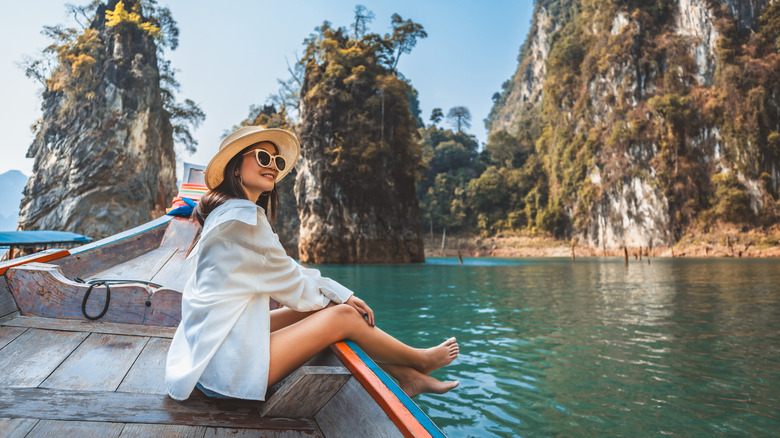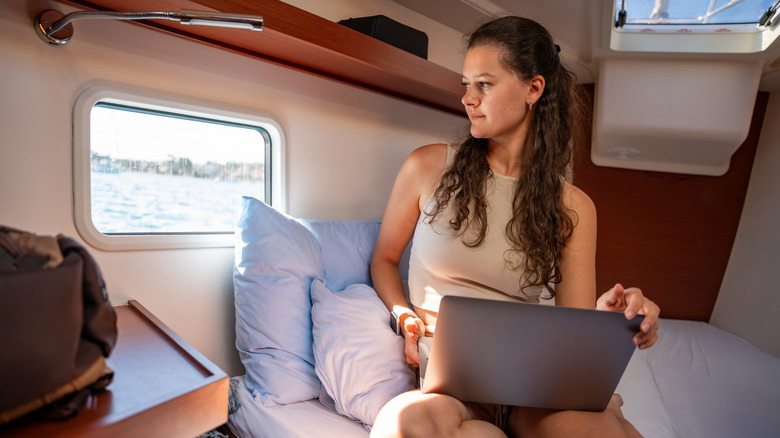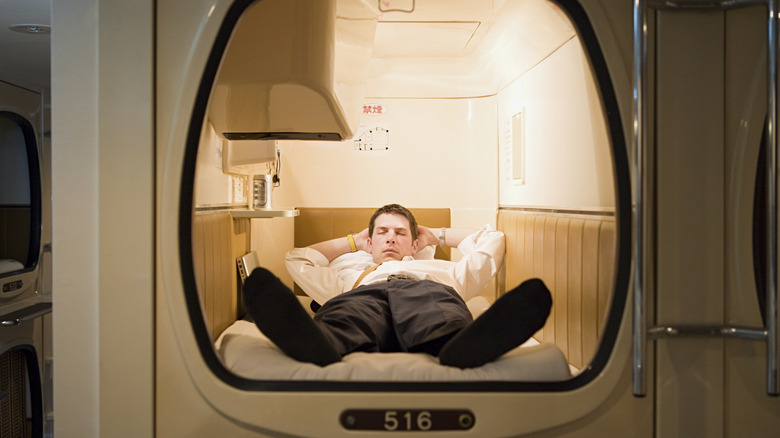Love Traveling Alone? Here's How To Avoid Paying Extra For It
Solo travel is on the rise. Whether you're looking for independence, a restful break, or just tired of waiting for plans to leave the group chat, setting off on an adventure alone is becoming more and more popular. Doing it fully solo isn't the only way to go, either. Another option for those traveling alone is to join a guided tour with a group of like-minded, adventurous travelers. No matter your preference, despite it seeming like the more affordable way to travel, traveling alone often comes with extra hidden costs.
Even when booking a guided tour or cruise, solo travelers are often punished with higher costs. And not every solo traveler is looking to bunk in a hostel, especially after leaving the backpacking era behind in their 20s. Hotel rooms and cruise cabins are more expensive when no other person is splitting the cost. Luckily, there are ways around paying the solo tax, from booking early to utilizing Rick Steves' clever tips to find the best value for lodging while on a solo trip. Love to travel by yourself? Here's how to avoid paying extra for it.
Book your trip dates strategically
One of the easiest ways to pay less as a solo traveler is to be strategic when booking your trip. Ensuring the cheapest accommodation will be easiest either far in advance of your trip or at the last minute, when unbooked rooms drop in price. For security and the greatest flexibility, booking early is your best bet. However, if you'll be traveling for a long time or are flexible about where you're willing to stay, booking late can be a great way to save money. It's also why Rick Steves sometimes recommends traveling to Europe without a hotel reservation.
Another option for saving money: book your trip during a shoulder season. Generally, the fall and spring months are the least busy and most affordable times to travel. Especially as a solo traveler, you'll be competing with fewer groups for bookings, which may also bring down the price on supplement charges. Try to plan your trip during one of these months to find affordable accommodations and, as a bonus, your destination will also likely be less crowded.
Lastly, the timing of when you book — even when early — is important. Be on the lookout for special holiday deals. Also, be flexible with the dates of your bookings. Often, flights can be cheaper a day or two before or after when you were ideally hoping to fly. The same goes for hotel rooms and travel packages. If you can, go into your booking session with a larger time frame in mind than you plan to be away, so you can book the most affordable option. This will provide you with more money to play around with during your trip.
Dodge the single supplement charges when booking
Perhaps the worst part of being a solo traveler is the extra costs you incur when booking a room for one instead of two. Because hotel rooms and tours often accommodate couples or friends, solo travelers often incur the costs for not having another person in that space. As you won't be splitting costs with a partner or friend, this can get a little pricey. Luckily, there are some ways to avoid single supplement costs.
First, if there's a supplement cost, try asking for it to be waived. This is the easiest way to get a cheaper reservation at a spot you really want to book. Don't expect this to work all the time, but during a slower season, they may just remove the extra charge. It's always worth trying. The worst they can say is no, and you can move on to other strategies. If you're booking your trip through a travel agent, you can ask them to negotiate this request for you.
You can also search for accommodations that do not have a single supplement. Usually, these are experiences aimed at solo travelers. So, either you'll be booking a room targeted at one person, or you'll be paired up with a roommate. On guided tours and experiences aimed at solo travelers, you'll often bunk with another traveler, so go in prepared with this expectation. If you're traveling on a cruise ship, many cruises now have smaller cabins aimed at solo travelers. Look for these specifically to avoid paying extra.
Find a private single-bed room or capsule hotel
Traditional rooms made to accommodate two or more people are typically more costly for a single traveler. The best way around this, if you don't want to bunk with other travelers, is to look for a purposefully "single" room to avoid the "single occupancy fees" that seem to punish solo travelers. These rooms are typically a little smaller and have one bed to accommodate only one traveler. This is a great way to save money and have some privacy while traveling alone.
These accommodations vary. In Europe, many budget hotels offer options for solo travelers at a lower rate. The rooms may be small, but they'll have all the amenities you expect to have in a hotel room. Capsule, or pod, hotels are great for this and have been popping up in major cities such as New York, London, and Tokyo. Now, these are tiny and best for travelers who only plan to sleep or lie down to relax in their hotel rooms. But they're cheap, clean, and private. If you're claustrophobic, a single bed in a traditional hotel is probably the best option for you.
Capsule rooms typically include a bed, a small amount of storage space, charging ports, and a fan to keep you cool at night. Capsule rooms usually cover all your basic needs while traveling without the extra room you'd get in a traditional hotel room. If you're a solo traveler who just needs a safe bed to sleep in and keep your stuff (plus Wi-Fi at night), this is a great option. Some pod hotels and hostels include a private bathroom in your pod, while others have options for guests to share a bathroom with other travelers. This is also a good way to save a bit more money as a solo traveler, as they're often cheaper than a traditional hotel room.



